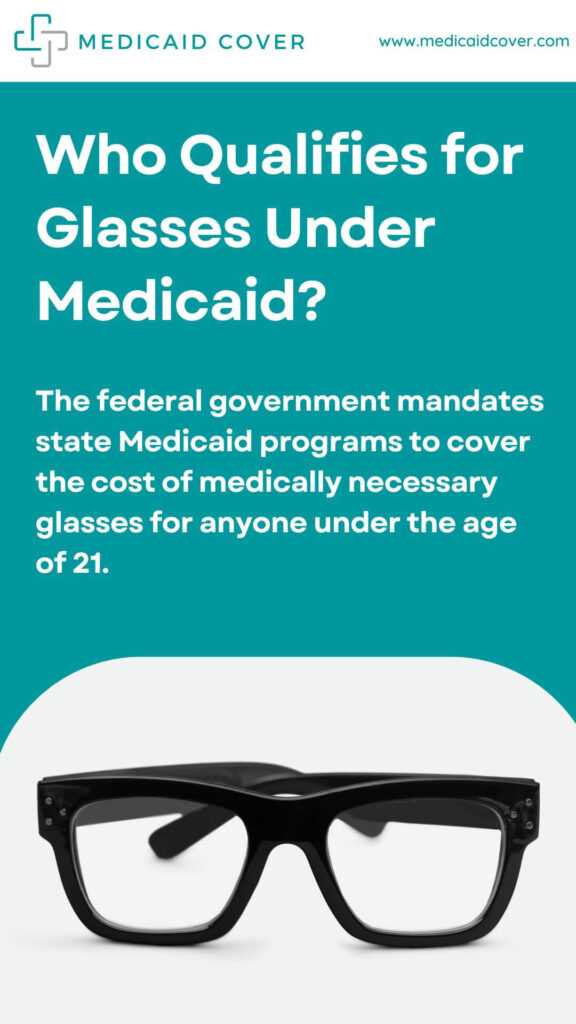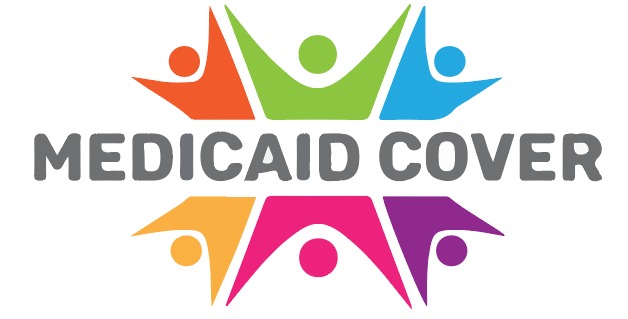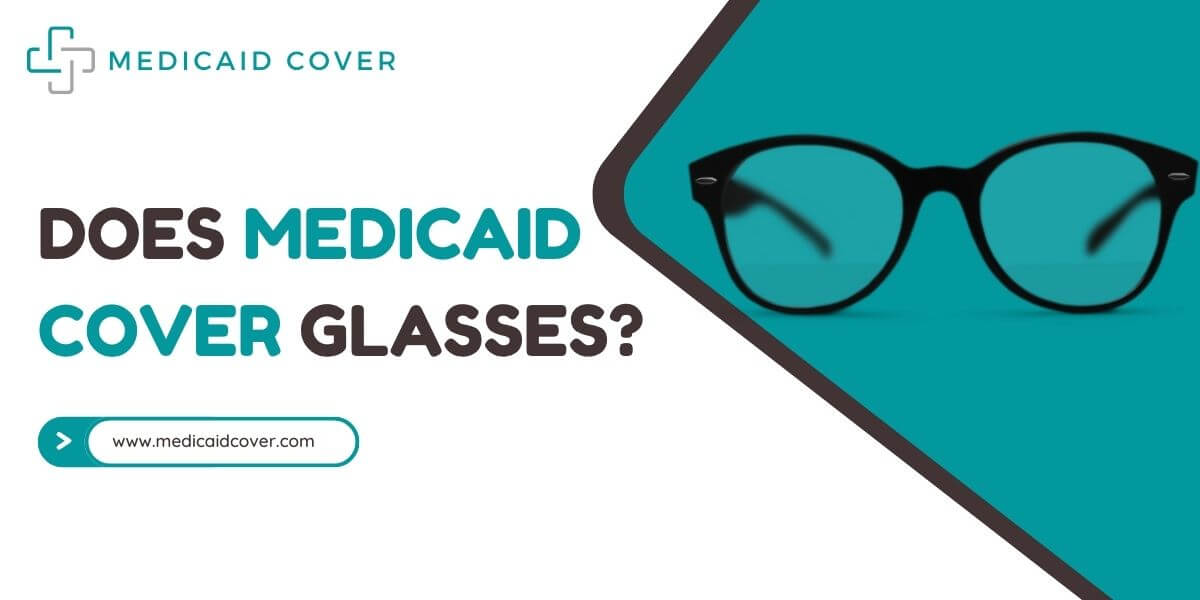We all hate our eyewear, especially in the rainy season, right? Earlier, weak eyesight was not that common and considered a big deal. But now, everyone has their classy eyewear from a top-class brand that carries their style.
Have you noticed the reason behind it? There are ample reasons that make our eyesight weak. While writing this, I’m wearing my glasses too.
As we all know that glasses are now part of the fashion world, many of us wear classy and stylish glasses which match our outfits, and for the best frames and quality, we suggest you check for modern and elegant frames.
As we all know, Medicaid is there to help us, especially regarding eye exams, but does Medicaid cover glasses too? Here are the list of Eye doctors that accept Medicaid near you.
Read the article to know whether ‘Medicaid covers glasses or not.
You may also be interested to know does Medicaid covers vision. check vision coverages here.
Does Medicaid Cover Glasses?
Medicaid offers varying levels of vision coverage depending on the state. Medicaid often pays the cost of vision care that is required for medical reasons. State laws differ on what constitutes medical necessity, although it typically involves diagnosing and treating an accident, illness, condition, or disease.
Even though many states cover the price of the services associated with getting eyeglasses and contact lenses, these items are not always considered medically necessary.
Prescription eyewear and inexpensive frames are typically covered, but you should check with your state’s Medicaid plan provider to see how much coverage is available.
It should be noted that most states do not pay for contact lenses when requested purely for aesthetic reasons, such as the fact that you prefer the way they look to spectacles.
People with certain eye conditions are eligible for contact lens covering. People will, for instance, be covered for contacts after cataract surgery.
Federal law does not require state Medicaid programs which cover the glasses cost. As a result, eyewear is an optional benefit offered by the majority of states.
However, Medicaid programs frequently cover the expense of purchasing new glasses.
As an illustration, Medicaid covers spectacles for children and young adults. In addition, Medicaid will pay for glasses for adults of any age if a doctor deems them medically essential.
Be aware that you will have less options for lenses if you are eligible for new glasses through Medicaid.
For instance, Medicaid will cover regular single-vision lenses, but you will be responsible for the cost out of pocket if you choose premium lenses.
Does Medicaid Pay For Glasses?
It is a concern that many Americans may have. Let’s first examine Medicaid and the services it offers. Medicaid is a federal program which is accessible to all demographic groups.
Additionally, Americans with little resources and income are given similar support. Additionally, this treatment is accessible to people of all ages.
A person with a lower income, seniors over 65, children, and pregnant women are all insured for insurance under this aid program.
Most health services are provided without charge, but some might demand a small upfront commitment. The insured person receives hospital bed and care services related services.
Does Medicaid Cover Eyeglasses?
The simple answer to everyone’s question about whether Medicaid covers glasses is yes. Medicaid offers services, including eye exams and glasses, to people under 21.
They typically do not wear designer glasses or contact lenses. Medicaid will pay for basic eyeglass frames and power lenses if the medical condition requires them. To learn more about the plan and the state’s acceptance, you must go to the necessary agency.
Although this criterion varies by state, Medicaid will typically cover the cost of glasses if necessary for medical reasons. According to the rule, medically necessary eyewear means detecting and treating an illness, accident, or condition.
Who Qualifies For Glasses Under Medicaid?
The federal government mandates state Medicaid programs to cover the cost of medically necessary glasses for anyone under the age of 21.

EPSDT (Early, Periodic, Screening, Diagnostic, and Treatment) is typically the umbrella term for this. However, several jurisdictions also offer eyewear to adults who need it for medical reasons.
In Alabama, Minnesota, and Mississippi, for instance, Medicaid programs cover glasses for all its beneficiaries, regardless of age.
Adults undergoing eye surgery can receive glasses through Medicaid programs in Colorado, West Virginia, and Oregon.
However, the Medicaid programs in North Carolina and Nevada do not offer any kind of eyewear to adults.
A verified ophthalmologist can provide an eye exam for Americans over 21 following Medicaid standards.
You may file a claim if your ophthalmologist advises you to wear glasses. But remember that if your claim is approved, you will only be reimbursed for a certain range of eyewear. However, you must make room in your budget if you desire expensive or premium eyeglasses.
When Does Medicaid Pay For Glasses?
Only Medicaid will cover the cost of your new glasses if an eye doctor advises you to wear them. A person will receive compensation for the glass fitting, lenses, frames, repairs, and replacement under this claim.
Be advised that Medicaid will start the payment for glass replacement once a year. Additionally, if you are Medicaid-eligible and 21 years old, you will receive compensation twice a year for glass replacement.
If a doctor determines that you need new glasses for a medical reason, Medicaid will pay for them. The Medicaid benefits for eyeglasses include :-
- Glass fitting
- Frames
- Lenses
- Repairs
- Replacements
Remember that Medically typically covers the cost of one new pair of glasses annually. If you are under 21, Medicaid will charge you for two additional pairs of glasses each year.
Does Medicaid Cover Glasses For Adults?
In fact, Medicaid pays for eyeglasses for adults and individuals over 65. If possible, try to find Medicaid-covered eye exams, vision correction, and eyewear. Children under 21 have a few alternatives for claiming vision assistance under federal law.
According to the circumstances, the child may have a routine visit. This periodic screening may assist in lowering the likelihood of more harm or damage at an older age.
What States Allow Medicaid To Cover Glasses?
Although most states allow Medicaid to cover the cost of your glasses and related expenses, this is not always the case.
Medicaid coverage of eyeglasses is not permitted in the following states :-
- Arizona
- Colorado
- Delaware
- Hawaii
- Louisiana
- Oklahoma
- Oregon
- Tennessee
- Virginia
- Washington
- West Virginia
- Wyoming
You will be only responsible for paying for the glasses if you reside in one of the states on the list.
You will get access to one or more glasses and additional eye exams if you are not in one of the states mentioned above.
Is There Any Extent Of Medicaid’s Coverage For Glasses?
Medicaid vision benefits range in scope from one state to the next. Typically, Medicaid will cover the cost of prescription glasses.
States also differ in terms of the conditions that are considered to be medically required.
Treatment for a sickness, infection or damage is typically included in these situations. Additionally, some states will pay for the costs of getting glasses even when they do not view them as medically necessary.
Find out what Medicaid will and won’t cover regarding glasses from your local Medicaid office to prevent paying a large amount out of pocket.
Medicaid benefits for glasses vary from state to state. Also, from state to state, different eye disorders might be treated. Since Medicaid only provides the insurer with essential eyewear.
Eyewear That Accepts Medicaid
While some jurisdictions just cover the cost of making the spectacles, others consider the expense of treating an illness, an injury, or a surgical procedure.
Which Eyewear Providers Accept Medicaid Cover?
You must proceed methodically and step-by-step if you want to be eligible to claim the eyeglasses that accept Medicaid. To begin with, make an appointment with an ophthalmologist or a location where Medicaid-eligible eyewear is sold.
You can manage your Medicaid plan by calling the phone and visiting the website of the mediator agency listed on your Medicaid insurance card.
To find the addresses of eye doctors or glass suppliers who accept Medicaid, go to their website. Put your location and desired plan in now. It will also show a list of service providers that Medicaid has approved.
Additionally, you can utilize KFF’s Medicaid Benefits database (Kaiser Family Foundation).
You can use this database to learn more about the eye services covered by your Medicaid plan and the state-specific restrictions on these treatments.
The organization that oversees your Medicaid plan should still be contacted for confirmation of specific plan information.
In What Situations Does Medicaid Cover Glasses?
For children under 21, Medicaid will cover the cost of a new pair of glasses; in some places, everyone can get glasses.
They must be regarded as medically required, which is one of the general requirements.
Medicaid will probably also cover you if you have serious eye problems and need ophthalmologist services. However, the examination process can vary because you must use your physical health Medicaid benefit.
Your primary care physician or doctor can direct you to an ophthalmologist if necessary and has all the solutions.
How Will Anyone, Know If They Have Medicaid Or Not?
Consult your plan provider if you want to know if you qualify for Medicaid and can use it to pay for your glasses. One of the web directories that lists where to find eyewear providers who take Medicaid will provide her contact information.
You can also apply there to see if you are eligible for Medicaid in your state. Remember that the eligibility requirements can change, so check frequently to be sure you’re still qualified.
What Will Medicaid Cover If You Need Glasses?
Depending on the state in which you live and receive Medicaid, you may be eligible for one or more of the following :-
- Frames
- Glasses fittings
- Lenses
- Replacement glasses
- Repairs
The most confusing item that Medicare might cover is typically lenses. Remember that Medicaid often covers common single vision lenses for near- and farsightedness repair.
In some regions, Medicaid even pays for bifocals and trifocals, but you should double-check with your local representative to be sure.
Does Medicaid Replace Glasses?
Medicaid frequently replaces glasses, but how frequently depends on your age and the state in which you reside.
Young individuals under 21 can frequently receive two replacements each year. Medicaid patients in the remaining groups typically get one replacement every year.
This covers situations where the glasses are damaged, taken, or lost. Additionally, Medicaid will often cover the cost of corrective eyewear.
Conclusion :-
A great option to get the medical care you or your family need is through Medicaid. In most states, children and young adults are given preference, so their chances are significantly greater.
As you can see, Medicaid will typically cover the cost of glasses even if you need them. You can pay the difference if your lenses and frames are more expensive than what Medicaid would cover. Now the confusion is all clear ‘does medicaid cover glasses’.
As usual, we recommend contacting your local Medicaid contact person for more information because eyeglass prices and Medicaid limits differ by state.
Frequently Asked Questions
Does Medicaid provide coverage for glasses?
Medicaid will pay for the following elements of eyeglasses: Lenses, Frames, eyewear fixtures Repair substitute glasses. Medicaid typically pays the price of one set of replacement glasses per year. You are permitted two new pairs of spectacles each year if you are under 21. If your glasses are damaged, stolen, or lost, you can get new ones.
Do Medicaid benefits for eye exams and glasses apply?
This indicates that the price of eye tests and eyewear is covered. In most states but not all, Medicaid will pay for eye tests for adults over 21. In addition to an eye checkup, several states will pay for a set of glasses or contact lenses.
Will Medicaid cover contact Lenses?
Simply pay the price difference for these specialized lenses. Furthermore, Medicaid frequently does not provide coverage for contact lenses. You’ll likely need to pay for contacts out of cash or with another supplemental insurance plan if you want them.

